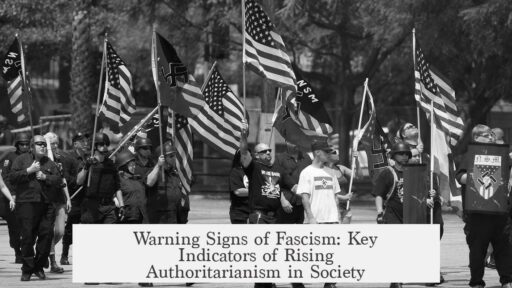Warning signs of fascism include powerful nationalism, disdain for human rights, identification of scapegoats, militarism, sexism, controlled media, and obsession with national security.
Fascist regimes promote intense nationalism that demands total allegiance to the state. In Italy and Germany, governments engineered grand events to showcase national superiority. For example, Nazi Germany orchestrated the 1936 Olympics to display their athletic and racial power. Hitler’s propaganda film Olympia served as a tool to glorify the nation. Italy’s fascist doctrine emphasized the state’s supremacy over individuals, leaving no space for outside human or spiritual values. It demanded total control and loyalty.
The disdain for human rights is evident in fascist governments’ brutal suppression of opposition and minority groups. Nazi Germany’s Holocaust is a stark example. Italy’s fascists also violently crushed political strikes and rebellions through their Blackshirt militia, killing thousands and destroying free presses. These actions demonstrate how fascist regimes prioritize state control over individual freedoms.
Scapegoating enemies unites fascist movements by blaming external or internal groups for national problems. Germany’s Nazis targeted Jews, promoting the “stab in the back” myth claiming Jews betrayed Germany in World War I. Italy blamed the Entente powers, Britain and France, accusing them of cheating Italy out of rightful territory. This notion of a “mutilated victory” fueled nationalist resentment and justified aggression.
Militarism is another core feature. Fascists exalt the military as central to national strength. Italy’s militaristic Blackshirt raids and the invasion of Ethiopia show this clearly. Germany’s remilitarization of the Rhineland defied post-World War treaties and proudly displayed the regime’s strength. Military action under fascism is often aggressive and expansionist.
Sexism appears in fascist ideology, but its extent varies. Italy’s regime promoted traditional gender roles centered on homemaking, consistent with 1930s norms and Catholic values. Nazi Germany emphasized motherhood and limited women’s previous freedoms under the Weimar Republic. While these views are patriarchal, the level of systemic oppression varies and may require personal judgment about whether it constitutes rampant sexism.
Mass media control is essential for fascists to shape public opinion and suppress dissent. Mussolini’s regime silenced opposition and censored the press. Hitler’s government restricted not only newspapers but also film and music. Joseph Goebbels, Hitler’s minister of propaganda, orchestrated extensive media manipulation. Films like Triumph of the Will serve as infamous examples of fascist propaganda.
Obsession with national security often accompanies fascist states. While this overlaps with militarism and nationalism, it manifests as harsh policing of perceived threats. Nazi Germany’s Night of the Long Knives targeted rivals within the regime itself through extrajudicial killings. Both fascist Italy and Germany invested heavily in eliminating internal opposition to secure absolute control.
| Warning Sign | Description | Example |
|---|---|---|
| Powerful Nationalism | Total loyalty to state, national superiority claims | 1936 Olympics in Germany, Italy’s totalitarian state doctrine |
| Disdain for Human Rights | Suppression and violence against opponents | Holocaust, Blackshirt militia repression |
| Identification of Scapegoats | Blaming groups to unify population | Jews in Germany, Entente powers in Italy |
| Militarism | Military supremacy, aggression | Rhineland remilitarization, Ethiopian invasion |
| Sexism | Enforced gender roles, motherhood focus | Women as homemakers in Italy, motherhood emphasis in Germany |
| Controlled Mass Media | Propaganda and censorship | Press suppression, Goebbels’ propaganda films |
| Obsession with National Security | Elimination of threats, surveillance | Night of the Long Knives, policing opposition |
- Fascism demands state supremacy and promotes strong nationalism.
- Human rights abuses are common under such regimes.
- Scapegoating groups helps consolidate power.
- Militarism and expansionism drive fascist policies.
- Sexism varies, but traditional roles are enforced.
- Mass media operates as state propaganda apparatus.
- National security concerns suppress opposition harshly.
Warning Signs of Fascism: Spotting the Red Flags Before They Dominate
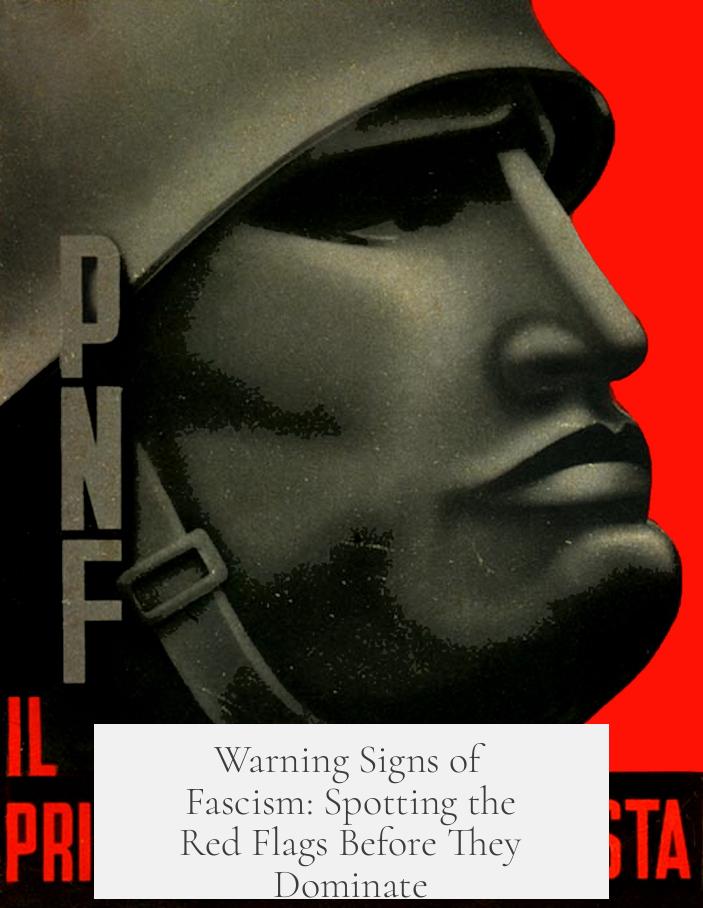
If you wonder what warning signs fascism brings to a society, the answer is clear: it shows itself in fierce nationalism, disdain for human rights, scapegoating enemies, militarism, sex-based discrimination, controlled media, and obsession with security. Now, what do these symptoms look like in action? Let’s explore each in detail, weaving history and insights so you can recognize these patterns anywhere.
Fascism is never subtle, but some signals may be overlooked or misread until it gains ground. This guide offers a keen eye on what to watch for and what to remember.
Powerful and Continuing Expressions of Nationalism
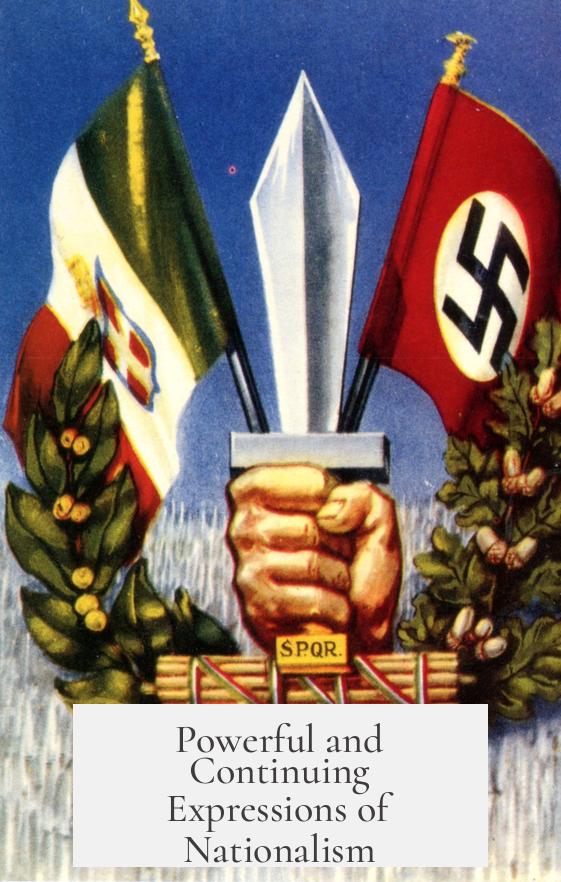
Imagine a society where the nation isn’t just a place you live, but your entire identity, your god, your law. Italy and Germany’s regimes in the early 20th century made this real—and worrisome. Fascist powers don’t simply love their country; they demand absolute allegiance. Beyond pride, this nationalism turns into a totalistic mindset where no life beyond the state counts.
Take Germany’s 1936 Summer Olympics. Not just a sports event but a stringent showcase of racial and athletic supremacy. Hitler commissioned the film Olympia to immortalize this display, following his earlier propaganda masterpiece Triumph of the Will. This wasn’t mere patriotism; it was a staged spectacle aiming to convince the world—and the Germans themselves—of supremacy.
Italy spoke grander ideas in The Doctrine of Fascism: “No individuals or groups [are] allowed outside the State.” Think about that. The individual, your rights, personal beliefs? Irrelevant. The State is the sole reality.
Disdain for the Importance of Human Rights
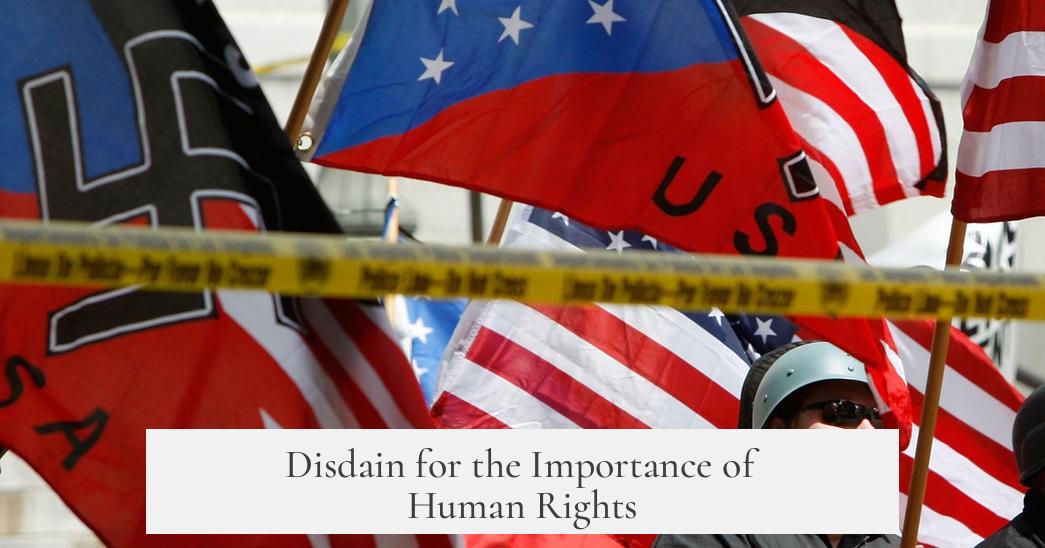
Under fascism, the individual’s rights get thrown out the window, sometimes violently. The Nazis are infamous for the Holocaust and mass murders, but Italy’s role is tighter, yet just as chilling.
Italy’s blackshirt militia brutally quashed strikes and political opposition. They torched newspaper presses, silenced speech, maimed and murdered thousands—all under the guise of maintaining order. This scared people into silence, while also providing a blueprint for Nazi Germany’s notorious SS.
Disrespect for human rights is never ambiguous under fascism—it’s raw and ruthless. When a regime uses violence as a tool against its own people, respect for life and freedom disappears.
Identification of Enemies/Scapegoats as a Unifying Cause
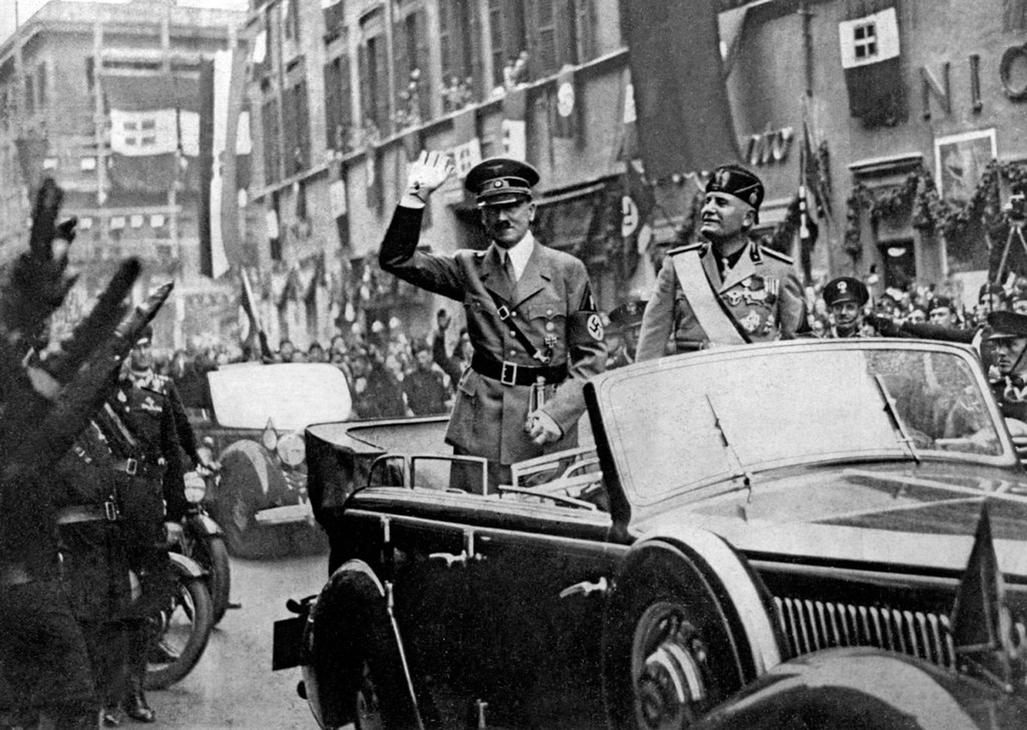
Who do you blame when things go wrong? Fascism needs enemies to rally against. Blame becomes a weapon.
In Germany, Jews were scapegoated through the “stab in the back” myth, which blamed societal problems, including defeat in World War I, on internal “saboteurs.” This false narrative justified horrific persecution.
Italy, meanwhile, turned its ire toward former allies Britain and France. Despite fighting alongside them, nationalists felt cheated at Versailles, believing their rightful territorial spoils were stolen. The “mutilated victory” myth fueled aggressive nationalism and expansionism, making foreign powers the scapegoats.
This tactic unites a fractured populace through fear and anger—classic fascist strategy.
The Supremacy of the Military and Avid Militarism
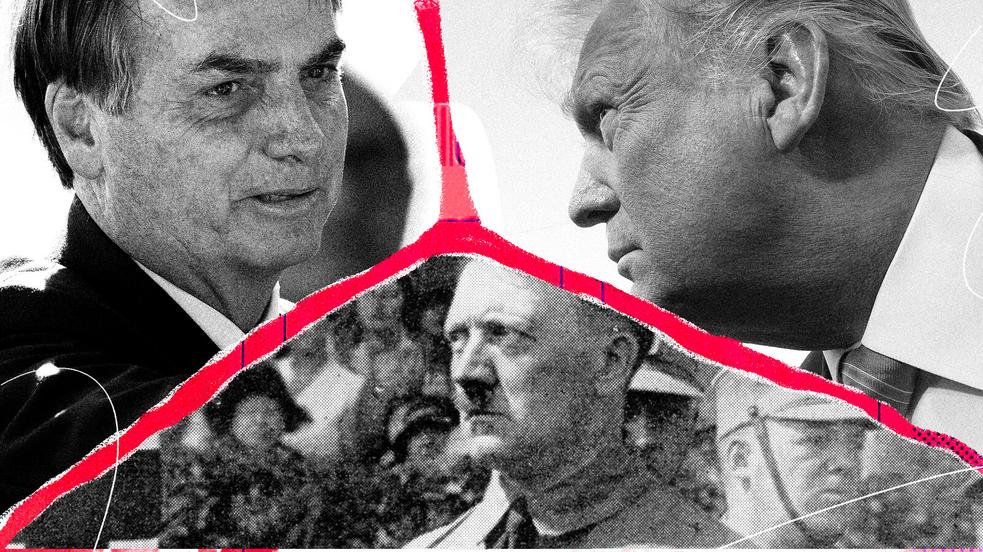
Militarism isn’t just for defense under fascism—it’s a centerpiece. Italy’s blackshirts raided political enemies, spurred by the haunting myth of the mutilated victory. And their Second Italo-Ethiopian War? Less a conflict, more a punch in the face to Africa, asserting dominance in a brutal show of force.
Germany also flexed muscles with the remilitarization of the Rhineland. This act blatantly violated post-WWI treaties, signaling defiance to the world. Troops marched where they legally shouldn’t, and the whole thing was turned into a prideful rally.
*Militarism*. It’s a loud message: power through weapons, strength through domination.
Rampant Sexism

Unlike the clear-cut cases above, sexism under fascism can be subtle or steeped in cultural norms. Italy’s view of women was very traditional—housemakers and factory workers supporting war effort but kept under the thumb of societal expectations. Harsh? By modern standards, absolutely. But for 1930s Italy, it was “normal.”
Germany showed a more intense focus on motherhood, pushing women to be vessels for the next Aryan generation. The Weimar Republic allowed more freedom for women, but under Hitler’s Reich, these freedoms shrank. Was it “rampant sexism”? The verdict depends on your perspective—but sexism was definitely institutionalized.
This points to dysfunction in gender roles and opportunities, limiting half the population’s potential. Under fascism, gender equality takes a backseat, often hard left.
A Controlled Mass Media
Fascism doesn’t tolerate free news. Mussolini and Hitler both understood the power of controlling the story. To quiet critics and mold public opinion, they crushed independent press and hijacked cinema, radio, and music.
Joseph Goebbels, Hitler’s propaganda chief, excelled in turning media into a weapon of persuasion. His films curated a false reality, glorifying the regime and demonizing enemies.
If press freedom is eroding, if art turns into government slogans, watch out. That’s fascism pulling the strings.
Obsession with National Security
National security under fascism becomes an excuse for paranoia and purge. The infamous “Night of the Long Knives” in Nazi Germany involved murdering political rivals and potential threats under the banner of safeguarding the nation.
This obsession overlaps with nationalism and militarism, but its hallmark is ruthless internal cleansing. Opponents and even former allies become expendable threats.
Ask yourself: is the government spending exorbitant energy on “security” that targets dissent? Is it a smokescreen for repression? That’s a precarious tip-off.
Why Bother Knowing These Signs?
Fascism’s roots are not invisible. History shows its cloak pulls off when you look for these warning signs. Recognizing nationalism that demands unchecked loyalty, media control, scapegoating, and violent disregard for rights is vital.
The lessons from Italy and Germany tell us that fascism grows quietly at first. Then, once entrenched, it eradicates all space for freedom or dissent. If you spot these red flags early, you can push back before they become irreversible.
How To Spot These Signs in Today’s World?
- Listen carefully to political rhetoric that excessively glorifies the nation or excludes ‘outsiders.’
- Watch for attacks on free press and efforts to control or spread propaganda.
- Note when governments use fear and blame to unite people against common enemies.
- Stay alert to militaristic posturing and unchecked spending on security forces targeting civilians.
- Observe attitudes and policies towards women and minorities—do they reinforce unequal roles?
Recognizing these signs isn’t always straightforward. Some come dressed as patriotism or security concerns. But always question: is critics’ voice being silenced? Are rights being trampled? Is hate being weaponized against minorities? These questions matter.
The Bottom Line
Warning signs of fascism stick out once you know where to look. From vocal nationalism to violent suppression, scapegoating, militarism, sexism, propaganda, and security obsessions—they form a pattern dangerous to democracy and freedom.
History paints a clear picture: Fascism thrives by crushing diversity of thought and imposing state supremacy over every aspect of life. If society tolerates these warning signs, the cost is human dignity and rights.
Stay sharp. Question loudly. Defend freely.
What role does nationalism play as a warning sign of fascism?
Nationalism in fascism often demands total loyalty to the state. It portrays the nation as superior and central. Italy and Germany used national pride to unify people and promote state control.
How do fascist regimes treat human rights?
Fascist states commonly ignore human rights. In Italy, militias violently suppressed opposition, ending free speech and killing many. Nazi Germany’s Holocaust remains a stark example of this disregard.
Why are scapegoats important in fascist movements?
Fascists often blame certain groups for national problems. Jews and foreign powers were scapegoated in Germany and Italy to rally support and justify aggressive policies.
How does militarism manifest in fascist governments?
Fascist regimes build strong military forces and use them openly. Germany’s Rhineland remilitarization and Italy’s Blackshirt raids show a focus on military strength to assert power.
What is the importance of controlled media in fascist states?
Fascists tightly control media to shape opinion. Mussolini and Hitler suppressed free speech and used propaganda films to spread their messages and silence critics.
